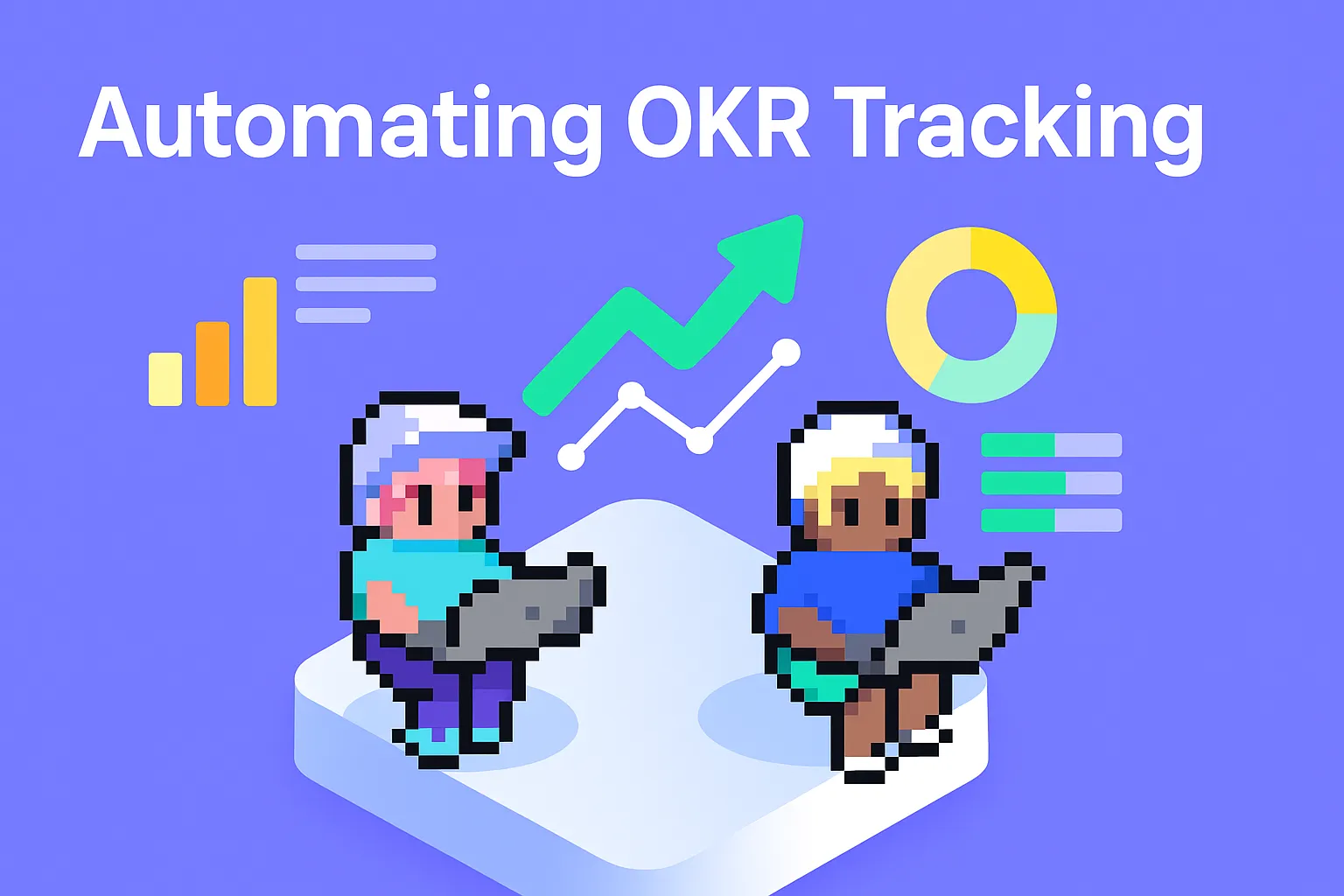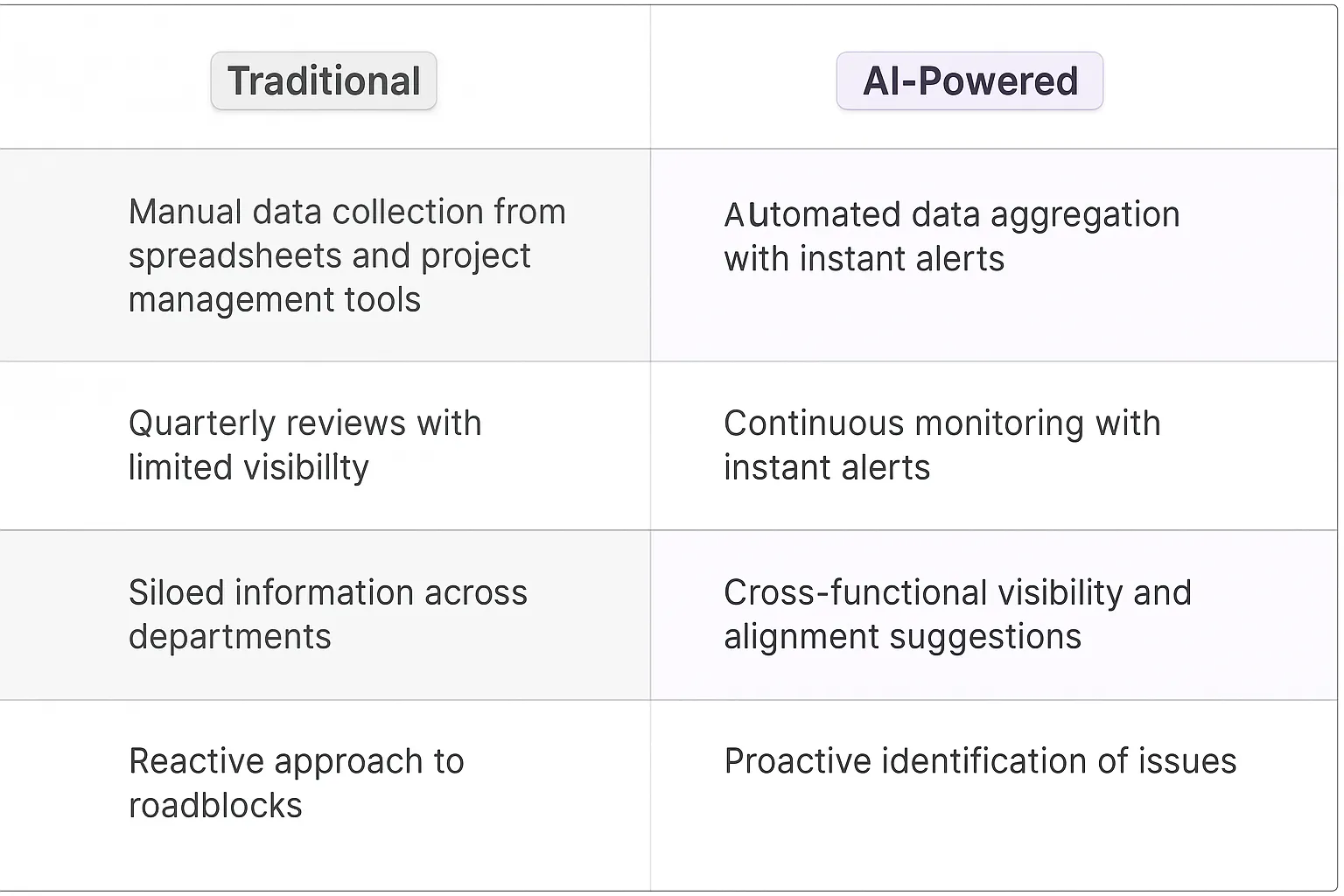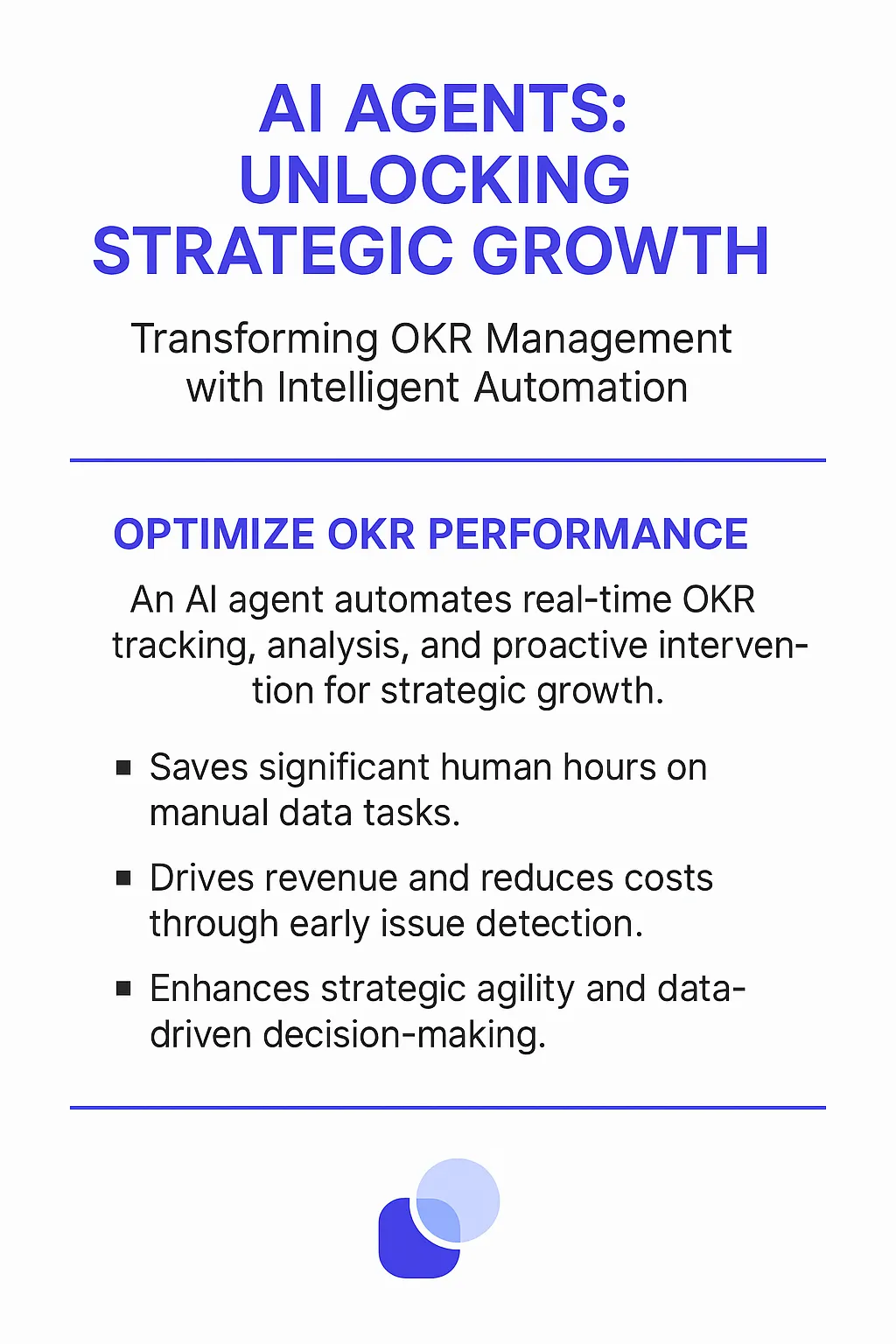OKR (Objectives and Key Results) Tracking AI Agents
Understanding OKR Tracking and Its Key Features
OKR tracking is a goal-setting framework used by organizations to define and track objectives and their outcomes. It's a method for aligning teams, fostering transparency, and driving measurable results. The process involves setting ambitious goals (Objectives) and defining specific, measurable outcomes (Key Results) that indicate progress towards those objectives.
Key Features of OKR (Objectives and Key Results) Tracking
- Goal Alignment: Ensures all teams and individuals are working towards common organizational objectives.
- Measurability: Focuses on quantifiable key results to track progress objectively.
- Transparency: Promotes open communication about goals and progress across the organization.
- Agility: Allows for regular review and adjustment of objectives to adapt to changing business environments.
- Accountability: Clearly defines ownership of objectives and key results.

Benefits of AI Agents for OKR (Objectives and Key Results) Tracking
What would have been used before AI Agents?
Before AI agents entered the scene, OKR tracking was a manual, time-consuming process. Teams relied on spreadsheets, project management tools, and countless meetings to set, track, and evaluate their objectives and key results. It was like trying to navigate a complex city without GPS - you'd eventually get there, but not without wrong turns and wasted time.
The traditional approach often led to inconsistent updates, siloed information, and a lack of real-time visibility into progress. Companies struggled to align individual efforts with overarching goals, resulting in missed opportunities and inefficient resource allocation.
What are the benefits of AI Agents?
AI agents are transforming OKR tracking from a cumbersome chore into a dynamic, intelligent process. These digital teammates act as always-on OKR experts, providing real-time insights and proactive guidance.
One of the most significant benefits is the ability to automate data collection and analysis. AI agents can pull information from various sources - project management tools, CRMs, analytics platforms - to provide a holistic view of progress without manual input. This not only saves time but also ensures data accuracy and consistency.
AI agents excel at pattern recognition, allowing them to identify trends and correlations that humans might miss. They can flag potential roadblocks before they become issues, suggest course corrections, and even predict the likelihood of achieving specific key results based on current trajectories.
Perhaps most importantly, AI agents democratize OKR tracking. They make it easy for everyone in the organization to understand and engage with OKRs, not just leadership or HR. By providing personalized insights and recommendations, they help individuals see how their work contributes to broader company goals, fostering a sense of purpose and alignment.
The continuous learning capability of AI agents means they get smarter over time. They learn from past OKR cycles, understanding what worked and what didn't, and apply these lessons to future planning and execution.
In essence, AI agents for OKR tracking are like having a team of expert strategists and data analysts working 24/7 to keep your company aligned and moving towards its goals. They're not just tracking OKRs; they're actively helping you achieve them.

Potential Use Cases of AI Agents with OKR Tracking
Processes
OKR tracking is ripe for AI-powered enhancement. These digital teammates can transform how companies set, monitor, and achieve their objectives. Let's dive into some game-changing use cases:
- Automated OKR alignment: AI agents can analyze company-wide objectives and suggest alignments across departments, ensuring everyone's rowing in the same direction.
- Real-time progress tracking: These digital teammates can continuously monitor key results, providing instant updates and flagging potential roadblocks before they become issues.
- Data-driven OKR refinement: By crunching historical performance data, AI agents can recommend more achievable yet challenging objectives for future cycles.
- Cross-functional collaboration boost: AI can identify synergies between different teams' OKRs, fostering collaboration opportunities that might otherwise go unnoticed.
Tasks
On a more granular level, AI agents can tackle specific OKR-related tasks with impressive efficiency:
- KPI data aggregation: These digital teammates can automatically pull relevant metrics from various sources, saving hours of manual data entry.
- Report generation: AI can craft detailed, insightful reports on OKR progress, complete with data visualizations and trend analysis.
- Meeting prep and follow-up: Before OKR check-ins, AI agents can compile relevant data and action items. Post-meeting, they can distribute summaries and next steps.
- Personalized coaching: By analyzing individual performance patterns, AI can offer tailored advice to help team members crush their objectives.
The beauty of AI in OKR tracking lies in its ability to handle the heavy lifting of data processing and analysis. This frees up humans to focus on the creative, strategic aspects of goal-setting and execution. It's not about replacing human judgment, but augmenting it with data-driven insights.
As companies scale, maintaining alignment and tracking progress becomes exponentially complex. AI agents act as a force multiplier, enabling organizations to maintain the benefits of OKRs at any size. They're the secret weapon for companies looking to execute with precision and adapt with agility in today's dynamic business landscape.
The potential here is massive. We're talking about AI that doesn't just track OKRs, but actively contributes to their success. It's like having a tireless strategist, data analyst, and project manager rolled into one, working 24/7 to keep your company on track. That's the kind of leverage that separates the winners from the also-rans in the startup world.

Industry Use Cases
The versatility of AI agents in OKR (Objectives and Key Results) Tracking makes them valuable across various industries. Let's dive into some meaty, industry-specific use cases that showcase how AI can elevate workflows and processes.
Think of these AI agents as your digital teammates, working tirelessly behind the scenes to keep your OKRs on track. They're not just passive observers; they're active participants in your company's growth story. These AI-powered allies are reshaping how businesses approach goal-setting and performance tracking, creating a new paradigm that's as exciting as it is effective.
From tech startups to Fortune 500 giants, organizations are tapping into the power of AI to transform their OKR processes. It's like having a data scientist, a project manager, and a strategic advisor rolled into one, available 24/7 to help you navigate the complex terrain of organizational goals and metrics.
But here's the kicker: these AI agents aren't just about crunching numbers. They're about unlocking human potential, freeing up your team to focus on the creative, strategic work that truly moves the needle. It's a shift that's as profound as it is subtle, quietly revolutionizing how we think about productivity and performance in the workplace.
So, buckle up as we explore how different industries are leveraging these AI agents to supercharge their OKR tracking. From tech to healthcare, finance to education, we're about to see how AI is rewriting the rules of the game.
Scaling OKRs in High-Growth Tech Startups
Let's talk about how OKR tracking AI agents can transform the way high-growth tech startups operate. These digital teammates aren't just fancy to-do lists; they're the secret sauce for scaling ambition and execution in hypergrowth environments.
Picture a Series B SaaS startup that's just hit product-market fit and is now sprinting towards that coveted unicorn status. They're adding 50 new team members a month, and their OKR process is starting to crack under the pressure. Enter the OKR tracking AI agent.
This digital teammate becomes the company's OKR sherpa, guiding both seasoned execs and fresh-faced new hires through the objective-setting wilderness. It's not just about tracking progress; it's about fostering a culture of ambitious goal-setting and relentless execution.
The AI agent can analyze historical performance data, market trends, and competitive intelligence to suggest stretch goals that are audacious yet achievable. It's like having a seasoned strategy consultant on tap, but one that scales infinitely and never sleeps.
As the quarter progresses, the AI doesn't just passively track progress. It proactively identifies potential roadblocks, suggests course corrections, and even facilitates cross-functional collaboration to keep OKRs on track. It's the ultimate accountability partner, nudging teams towards their north star metrics without the need for micromanagement.
But here's where it gets really interesting: the AI agent becomes a treasure trove of organizational intelligence. It can identify patterns in successful OKRs, surface insights on team dynamics, and even predict which objectives are most likely to drive exponential growth. For a startup in hypergrowth, this kind of data-driven decision making can be the difference between becoming the next Airbnb or ending up in the startup graveyard.
The result? A startup that can maintain its agility and execution speed even as it scales rapidly. OKRs evolve from a quarterly chore to a dynamic, real-time strategy alignment tool. And most importantly, it allows founders and executives to focus on what really matters - building game-changing products and closing those mega-deals - while ensuring the entire organization remains laser-focused on the metrics that matter.
In the high-stakes world of tech startups, where speed and focus are everything, OKR tracking AI agents aren't just a nice-to-have. They're the secret weapon for scaling not just your team, but your ambition.
OKR Tracking AI Agents in E-commerce: The Amazon Approach
Let's dive into how OKR tracking AI agents are reshaping the e-commerce landscape, with a focus on industry giant Amazon. This isn't just about setting quarterly goals; it's about creating a data-driven, objective-focused culture that permeates every level of the organization.
Amazon's scale is mind-boggling. We're talking about a company that ships millions of packages daily, operates in dozens of countries, and has its fingers in everything from cloud computing to grocery delivery. Managing OKRs across such a diverse and massive operation is a Herculean task – one that's ripe for AI intervention.
The OKR tracking AI agent at Amazon isn't just a glorified spreadsheet. It's a sophisticated system that integrates with every facet of the business. It pulls real-time data from warehouse operations, customer service interactions, AWS usage metrics, and even Alexa engagement stats to provide a holistic view of company performance.
But here's where it gets interesting: the AI doesn't just track progress. It actively suggests new OKRs based on emerging trends and opportunities. For instance, it might notice a spike in eco-friendly product searches and recommend a key result around increasing the visibility of sustainable items. This proactive approach keeps Amazon ahead of the curve, constantly adapting to shifting consumer preferences.
The AI agent also plays a crucial role in Amazon's famous "two-pizza teams." These small, autonomous units are the secret sauce behind Amazon's innovation engine. The OKR tracking AI helps these teams stay aligned with broader company goals while maintaining their agility. It can flag potential conflicts between team OKRs, suggest collaborations, and even predict which objectives are likely to have the biggest impact on Amazon's bottom line.
One of the most powerful features of Amazon's OKR AI is its ability to contextualize goals. It doesn't just tell you if you're on track; it tells you why you're on track (or why you're not). By analyzing vast amounts of historical data, it can identify the key drivers behind successful OKRs and share these insights across the organization. This creates a continuous learning loop, where each OKR cycle becomes more effective than the last.
The impact of this AI-driven approach to OKRs is profound. It allows Amazon to maintain its "Day 1" mentality even as it becomes an increasingly complex organization. The AI ensures that every employee, from warehouse workers to Jeff Bezos himself, is aligned on what matters most. It's not just about tracking progress; it's about creating a culture of measurable ambition and relentless execution.
In the cutthroat world of e-commerce, where margins are thin and competition is fierce, Amazon's OKR tracking AI isn't just a nice-to-have. It's a critical tool for maintaining their market dominance and continuing to push the boundaries of what's possible in retail. As other players in the space start to adopt similar technologies, we might be witnessing the birth of a new era in corporate goal-setting – one where AI doesn't just track our ambitions, but actively shapes them.
Considerations
Technical Challenges
Implementing an OKR tracking AI agent isn't just about slapping some machine learning on top of your existing processes. It's a complex dance of data, algorithms, and human behavior. One of the biggest technical hurdles is data integration. Your AI needs to pull information from a multitude of sources - project management tools, CRMs, financial systems, and even those pesky spreadsheets that refuse to die. This isn't just a matter of APIs and data pipelines; it's about creating a cohesive data model that can represent the nuanced reality of your business objectives.
Then there's the challenge of natural language processing. OKRs are often written in human language, full of context and nuance. Your AI needs to parse this, understand it, and translate it into quantifiable metrics. This isn't just about keyword matching; it's about understanding intent, context, and the subtle differences between "increase revenue" and "maximize profitability."
Let's not forget about the AI's decision-making capabilities. It needs to not just track progress, but make intelligent suggestions for course corrections. This requires a deep understanding of your business logic, industry trends, and the complex interplay between different objectives. It's not enough to flag that a key result is off track; the AI needs to understand why and suggest meaningful actions.
Operational Challenges
On the operational side, we're dealing with a whole different beast. First up: change management. Introducing an AI into your OKR process isn't just a tech upgrade; it's a fundamental shift in how people work. You're asking teams to trust an AI with their goals, their progress, and potentially their performance evaluations. That's a big ask, and it requires careful change management to avoid resistance and ensure adoption.
Then there's the question of accountability. When an AI is tracking and suggesting OKRs, who's responsible when things go off track? Is it the team lead, the individual contributor, or the person who trained the AI? This isn't just a philosophical question; it has real implications for how people engage with the system and how performance is evaluated.
Data privacy is another minefield. Your OKR AI is going to be handling sensitive information about your company's goals, strategies, and individual performance. How do you ensure this data is protected? How do you manage access controls when the AI needs broad access to be effective?
Finally, there's the challenge of continuous improvement. An OKR tracking AI isn't a set-it-and-forget-it solution. It needs to learn and adapt as your business evolves. This requires ongoing training, monitoring, and refinement. Who's responsible for this? How do you ensure the AI is getting smarter over time, not just reinforcing existing biases or outdated patterns?
Implementing an OKR tracking AI is a journey, not a destination. It's about more than just technology; it's about reshaping how your organization sets goals, measures progress, and drives results. The challenges are significant, but so are the potential rewards. The key is to approach it with eyes wide open, ready to tackle both the technical and human elements of the transformation.
The Future of OKRs: AI-Powered Precision and Agility
AI agents are not just enhancing OKR tracking; they're fundamentally reshaping how organizations approach goal-setting and performance management. By providing real-time insights, predictive analytics, and personalized recommendations, these digital teammates are enabling companies to execute with precision and adapt with agility in an increasingly complex business landscape.
The integration of AI into OKR tracking represents a significant leap forward in organizational effectiveness. It's not about replacing human judgment, but augmenting it with data-driven insights. As AI technology continues to evolve, we can expect even more sophisticated applications in OKR tracking, further blurring the line between technology and strategy.
For companies willing to embrace this AI-driven approach to OKRs, the potential rewards are substantial: increased alignment, improved performance, and a competitive edge in their respective industries. The future of OKR tracking is here, and it's powered by AI.












